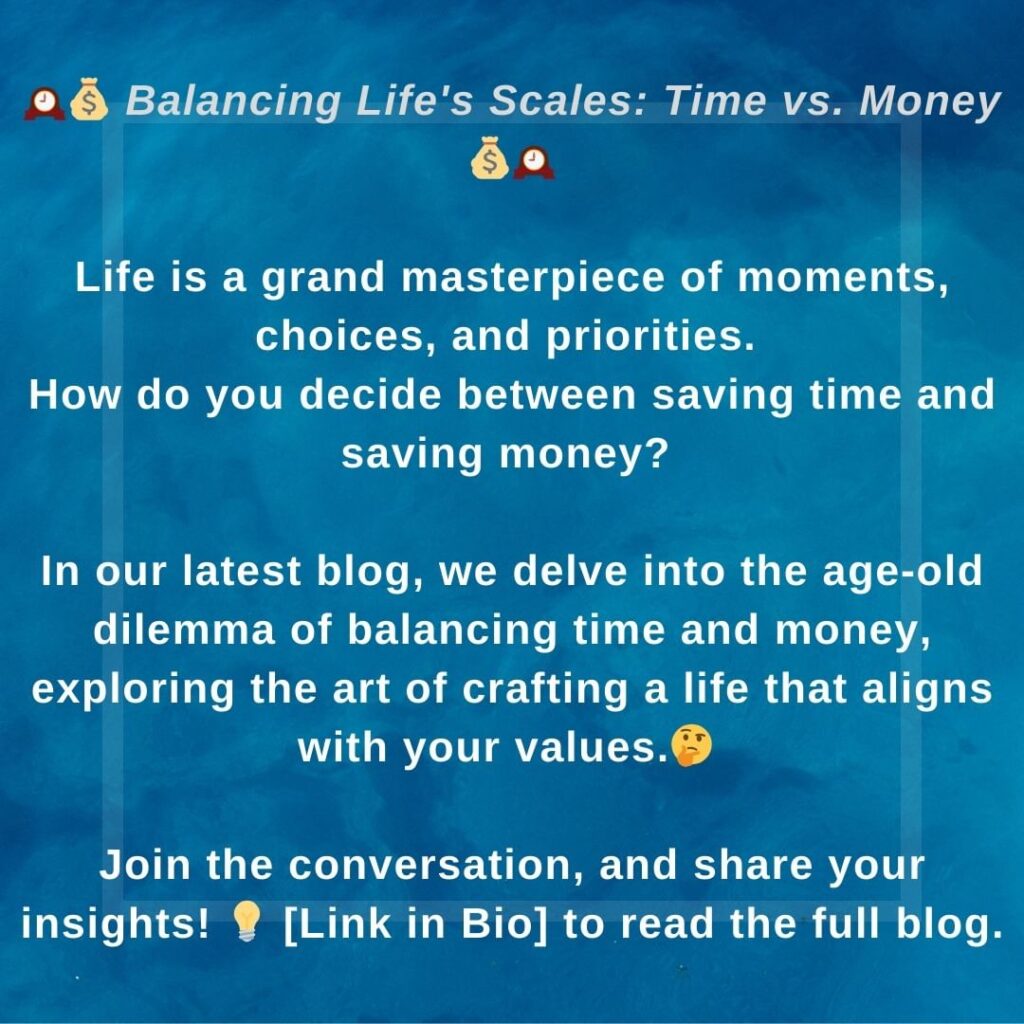“Explore the eternal dilemma of time Vs. money and discover the art of balance. Delve into the complexities of life’s choices and uncover the richness of crafting a life that aligns with your values.”
The Ageless Dilemma: Time Vs. Money
Life often presents us with a profound and age-old dilemma: time or money? It’s a decision that continually tugs at our hearts and minds, a choice that can shape our paths and define our priorities. In this blog, we’ll embark on a journey to unravel the complexities of this timeless conundrum and explore the art of balancing time and money in our lives.
Chapter 1: The Currency of Time
Time, they say, is the most valuable currency we possess. It’s the unrelenting heartbeat of our lives, ticking away with each passing moment. We prioritize it when we yearn for extra minutes with loved ones, to explore our passions, or to simply savor life’s beauty. The question is, how do we spend this precious currency?
Chapter 2: The Price of Convenience
Sometimes, we’re faced with choices that seem to pit time against money. Do we pay more for convenience and proximity, or do we invest our time and resources in the pursuit of a more economical option? It’s a decision that challenges our notions of value and cost.
Chapter 3: Opportunity Cost
Each decision we make carries an opportunity cost. When we save money, we might spend more time. Conversely, when we prioritize time, we may have to allocate more funds. The challenge is to weigh these costs and benefits in the context of our long-term goals and desires.
Chapter 4: The Power of Balance
Finding equilibrium between time and money is an art. It requires us to consider the specific situation, our values, and the opportunity to optimize both. We can’t sacrifice the joy of life for the accumulation of wealth, nor can we squander our time recklessly.
Chapter 5: Quality of Life
Ultimately, our decisions should enhance our quality of life. A choice that brings us contentment, reduces stress, or creates meaningful experiences can be as valuable as financial savings. It’s the moments of joy and fulfillment that truly enrich our existence.
Crafting Your Unique Path: Balancing Time Vs. Money for Optimal Living
In the grand tapestry of life, the tug-of-war between time and money is a dance that we all participate in. There’s no universal answer; the solution lies within the unique story of your life. It’s about making choices that align with your goals, priorities, and values, whether it’s time for yourself or money to secure your future.
Remember, life is a beautiful mosaic of moments, investments, and experiences. Balancing time and money is not a rigid equation; it’s an ever-evolving journey. And in the end, the most beautiful decisions are those that reflect the true essence of who you are.
So, as you face the crossroads of time Vs. money, may you choose wisely and craft a life that’s uniquely your own, filled with richness in every sense.
Do Follow for More Tips and Inspiration:
- Instagram: Follow us on Instagram
- Pinterest: Follow our Pinterest profile
After reading about the eternal dilemma of Time Vs. Money, you might also be interested in exploring another timeless struggle: the tug-of-war between family and work. Discover more insights and solutions by visiting our article on this topic: The Tug of War Between Family and Work.
FAQs
- What is the significance of the time vs. money dilemma in our lives?
- How does our perception of time influence our decisions about money, and vice versa?
- What are some strategies for effectively managing both time and money in daily life?
- How can prioritizing one over the other impact our overall quality of life?
- What role do personal values and priorities play in balancing time and money?
- Can you provide examples of situations where the trade-off between time and money is most apparent?
- How do societal norms and expectations contribute to the time vs. money dilemma?
- What are some common misconceptions about balancing time and money?
- Are there cultural differences in how individuals approach the balance between time and money?
- How can mindfulness and self-reflection help in achieving a harmonious balance between time and money?
- What are the long-term consequences of consistently prioritizing either time or money over the other?
- In what ways can technology and automation aid in managing both time and money more efficiently?
